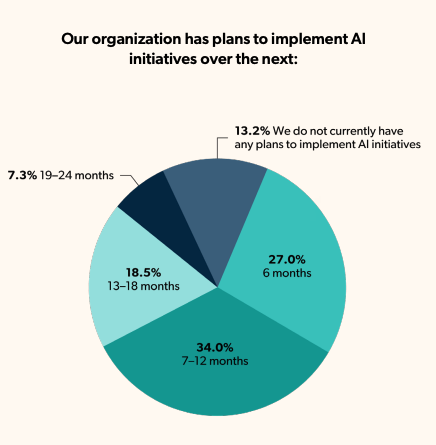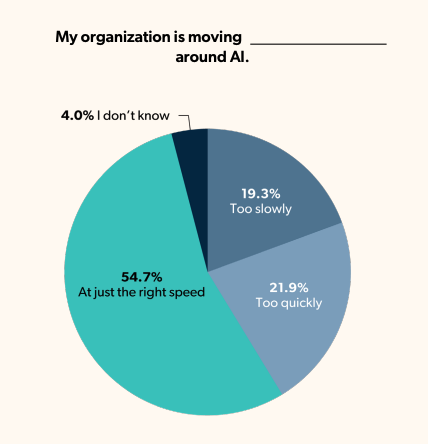AI’s rise in both the business and consumer worlds has been astonishingly exponential. Businesses are using AI to generate content, analyze data, automate processes, and more. But small and medium-sized enterprises (SMEs) look and act very differently from their enterprise counterparts. This prompts the question: How are SMEs approaching AI? Recent data from a 2024 JumpCloud study of SME IT may help answer it.
This blog will cover the ways that SMEs are approaching AI, including their drivers, points of hesitation, and pace of adoption. Unless otherwise cited, all data in this article comes from JumpCloud’s SME IT Trends 2024 report.
The Bright Side: What’s Compelling SMEs to Adopt AI?
According to JumpCloud’s 2024 report on the state of SME IT, 76% of IT professionals working at SMEs agreed that their organizations should be investing in AI. Seventy-nine percent think that it’s a net positive for their organization.


Those are some encouraging statistics. But what’s driving this positivity?
AI presents SMEs an affordable and actionable way to streamline operations, cut costs, and generate revenue. A recent survey found that automating processes to reduce costs was the most popular reason SMEs were investing in AI. Revenue increase initiatives like sales and marketing optimization were a close second. The most popular form of cost-reducing automation was media and content generation. This is an area where generative AI has become particularly popular. (Rest assured, this article was still authored by a human).
In short, AI offers SMEs an affordable means to make great strides in terms of revenue, profitability, and efficiency. These gains are likely contributing to IT professionals’ positive feelings toward AI as a whole.
However, not all SMEs are fully on board. Next, we’ll explore some of SMEs’ common concerns and doubts around AI.
The Dark Side: What Are Some Concerns Around AI Adoption?
While many SMEs are eagerly adopting AI, some are more hesitant. Interestingly, data suggests that much of the hesitation around AI adoption lies with smaller SMEs. Consider the following breakdowns by company size.

In general, small SMEs are less eager to adopt AI and less mature in their AI initiatives. For example, 58% of IT professionals working at the smallest SMEs (fewer than 10 employees) are in favor of their organization investing in AI. Eighty-two percent of IT professionals at larger SMEs (more than 500 employees) said the same thing. Additionally, only 37% of the smallest SMEs have developed policies around AI, while 71% of large SMEs have done so.
Regardless of size discrepancies, however, many SMEs expressed concerns around AI and security. When asked if AI was outpacing their organization’s ability to protect against threats, 62% of IT professionals from all sizes of SMEs said yes.
Further reading: 3 Security Implications of ChatGPT and Other AI Content-Generation Tools

In addition to security concerns, some SMEs seem to be hesitant to adopt AI because they don’t know enough about it. A firm surveyed 816 U.K. small businesses and found that some SMEs feel uncomfortable with the idea of adopting AI. They stated they don’t feel they understand it well enough to use it effectively. Nearly half (46%) of respondents reported this as their biggest point of hesitancy with AI, with security concerns coming in second at 31%. Other reasons included the validity of AI-generated content, potential abuse of intellectual property, and long-term viability for their business.
How Quickly Are SMEs Adopting AI?
In general, SMEs seem eager to adopt AI. Sixty-one percent of SME IT professionals said they expected their organizations to implement AI initiatives within the next year. That’s compared to only 13% who said their organizations didn’t plan to implement AI at all. Company initiatives seemed to reflect these sentiments: 63% said that their companies have already developed a policy around AI.
The majority of SMEs that plan to adopt AI intend to do so some time over the next 18 months, with only 7% saying they would take longer. The time frames of 0-6 months, 7-12 months, and 13-28 months saw a fairly even split among respondents. The most popular time frame by a slim majority being 7-12 months, followed closely by the more aggressive rollout window of six months.

When asked how they felt about timing, about half said they felt their organization was moving at the right pace. This suggests that there may not be one right timeline for every organization. SMEs seem to be planning their rollouts appropriately based on their specific needs and resources.

Learn More About SMEs and AI
AI has become a significant solution for SMEs, which has made it a subject of interest for JumpCloud’s ongoing research. We’ll continue to collect original survey data to learn how new developments like AI are affecting SMEs and SME IT professionals. Our next SME IT Trends report will follow up on these statistics and dive deeper into other pressing SME IT topics — keep an eye out for it this July.
In the meantime, you can dive deeper into this data in our early 2024 SME IT Trends report. It includes insights into AI as well as SME IT professionals’ views and experiences with security, job prospects, layoffs, budgeting, tooling, and more. Download the free report.




